COOPERATION MODEL
ARTIFICIAL INTELLIGENCE
PRODUCT ENGINEERING
DevOps & Cloud
LOW-CODE/NO-CODE DEVELOPMENT
INDUSTRY
FRONTEND DEVELOPMENT
CLOUD DEVELOPMENT
MOBILE APP DEVELOPMENT
LOW CODE/ NO CODE DEVELOPMENT
EMERGING TECHNOLOGIES







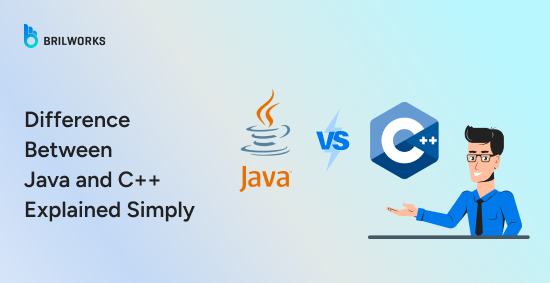
Is faster always better? Or is flexibility what really matters in modern software development?
That question often surfaces when debating Java vs C++. They are two of the most influential and widely used programming languages in the software industry. Both are object-oriented, both are widely used, and both have an enormous ecosystem. But under the surface, they follow very different design philosophies.
Java development takes a different approach from C++. In Java, the emphasis is on platform independence, ease of use, and safety, making it ideal for web and enterprise development. C++ is more suited for high-performance applications and offers greater control and customization for system-level programming. While C++ provides capabilities that Java may lack, especially in terms of low-level resource management, Java remains a dependable choice for large-scale software projects. Ultimately, the right language depends on the specific intricacies and requirements of your project.
In this comparison, we'll break down the key differences between Java and C++. What are they, how do they differ in performance, and which one should you opt for in your next project?
Before we dive into the technical details, here’s a quick overview of how the Java programming language and C++ stack up in key categories.
Java is ideal for cross-platform development and applications where speed of development and portability are priorities. C++ shines in scenarios that demand high performance, low-level hardware interaction, and maximum control over system resources.
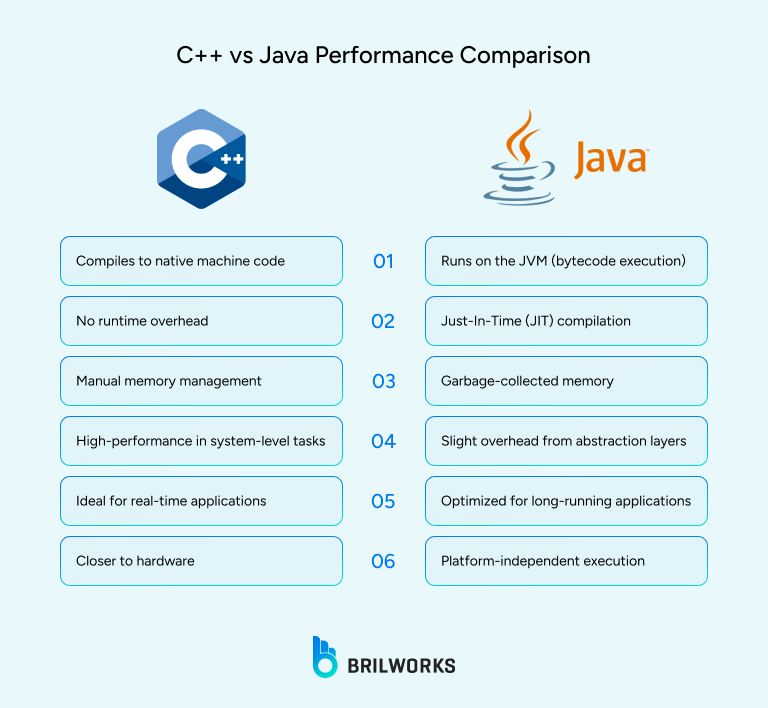
Performance is one of the most debated aspects of Java vs C++. While C++ is generally considered faster due to its low-level nature and native execution, Java offers modern runtime optimizations that can close the gap in certain scenarios. Let's break down the performance comparison based on key technical characteristics.
C++ is a statically compiled language. Code is converted directly into machine instructions before execution. This allows programs to run natively on the CPU with minimal overhead.
Conversely, Java is compiled to bytecode, which is then interpreted or JIT-compiled by the Java Virtual Machine (JVM) at runtime. Java has a vast variety of technologies at its disposal that have grown immensely in the last three decades. Although this adds a layer of abstraction, modern JVMs optimize performance through Just-In-Time compilation and runtime profiling.
Result: C++ often wins in raw execution speed, but Java can perform competitively in long-running applications.
C++ offers manual memory management using new/delete, as well as automatic cleanup via RAII (Resource Acquisition Is Initialization). This enables deterministic destruction of objects, giving developers fine-grained control over resource usage.
On the other hand, Java uses automatic garbage collection, which improves safety and developer productivity but can introduce performance variability. While modern garbage collectors are efficient, unexpected collection cycles can pause execution and increase memory overhead.
Result: C++ allows for tighter memory control and can be more memory-efficient, while Java trades some performance for safety and ease of use.
C++ provides direct memory access through pointers, unchecked array access, and low-level features like type punning. These enable optimizations at the hardware level but come with higher risks.
Java enforces strict memory safety. It does not allow pointer arithmetic or direct memory manipulation, which can limit low-level optimizations.
Result: C++ excels in performance-critical systems programming; Java prioritizes stability and safety, sometimes at the cost of speed.
f you're planning your next big project and need proven expertise in Java, now is the time to hire Java developers who bring both technical depth and practical experience to the table. Our team specializes in crafting reliable, future-ready solutions that align with your business goals and perform at scale.
Java performs bounds checking on all array accesses and ensures default initialization of primitive variables. While this enhances reliability, it adds runtime overhead.
C++ does not enforce bounds checking by default, which allows for faster array operations, but it does introduce potential risks like buffer overflows.
Result: Java's safety checks run-time errors, but slightly degrade performance compared to C++.
C++ templates are resolved at compile time and can lead to highly optimized, type-specific code. However, excessive template usage may result in code bloat.
Java generics use type erasure at compile time, meaning type information is removed, and a single implementation is reused. This reduces flexibility and runtime efficiency compared to C++ templates.
Result: C++ provides more efficient compile-time polymorphism; Java sacrifices some performance for simplicity and backward compatibility.
C++ enables cache-friendly memory layouts by allowing object allocation strategies that promote spatial locality. Developers can avoid heap allocations for performance-critical paths.
Java uses reference semantics for all objects, which can result in frequent memory indirections and cache misses. Although the JVM can optimize layout to some extent, manual control is limited.
Result: C++ has the edge in cache optimization and memory locality, which can significantly affect real-world performance.
Java includes built-in language support for multi-threading with features like the synchronized keyword and escape analysis that can remove unnecessary locking, and when combined with proper performance monitoring tools, it can help identify bottlenecks early in development.
C++ (since C++11) offers a defined memory model and standard threading libraries, but efficient concurrency often relies on external libraries and careful design.
Result: Both offer high-performance multi-threading, but Java's runtime can optimize naive multi-threaded code better out of the box.
C++ delivers higher performance potential due to its native execution, direct memory access, and control over system resources. It is often the preferred choice for applications where speed and optimization are critical.
Java, while generally slower in raw terms, leverages JIT compilation and runtime optimizations to deliver solid performance, and safety makes it a popular choice for cross-platform consistency matter.
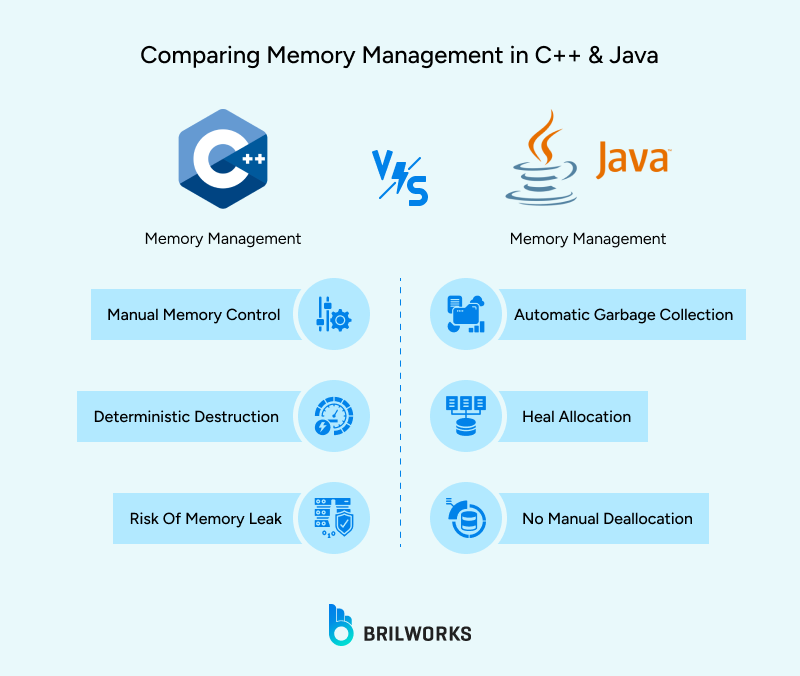
How each language handles memory is the most critical area that impacts C++ vs Java performance. Memory management also shapes how developers write, optimize, and debug their applications.
In C++, developers are given full control over memory allocation and deallocation. You can allocate memory on the heap using new and free it with delete. More importantly, C++ supports stack-based memory and deterministic object destruction through RAII. This means resources are automatically released when an object goes out of scope.
C++ also supports smart pointers that help manage ownership and lifetime.
Pros:
Precise control over memory lifecycle
Efficient use of resources in performance-critical systems
No garbage collection interruptions
Cons:
Higher risk of memory leaks, dangling pointers, and undefined behavior
Developers must manually manage resource cleanup
Java simplifies memory handling by abstracting it away from the developer. Memory is allocated on the heap, and the Java Virtual Machine (JVM) automatically reclaims unused objects through garbage collection. While this reduces the risk of memory leaks caused by forgetting to deallocate, it introduces non-deterministic behavior; developers don't control when memory is freed.
Modern JVMs use generational garbage collectors, which you can optimize and use advanced algorithms to minimize pauses, but large-scale applications may still experience performance hiccups during collection cycles.
Pros:
Easier memory management for developers
Lower chances of crashes due to manual memory mishandling
JVM optimizations (like escape analysis and bump allocation) improve allocation speed
Cons:
Garbage collection pauses can affect application responsiveness
Less control over object lifetimes and memory layout
Risk of memory leaks due to lingering references (a common GC pitfall)
The most significant difference between C++ and Java in memory management lies in control vs automation. C++ gives developers control over optimizations that can yield better performance. Java prioritizes safety through automated garbage collection. Although that doesn't mean that C++ is not safe, it is, but there is also the chance of human error because you are in control.
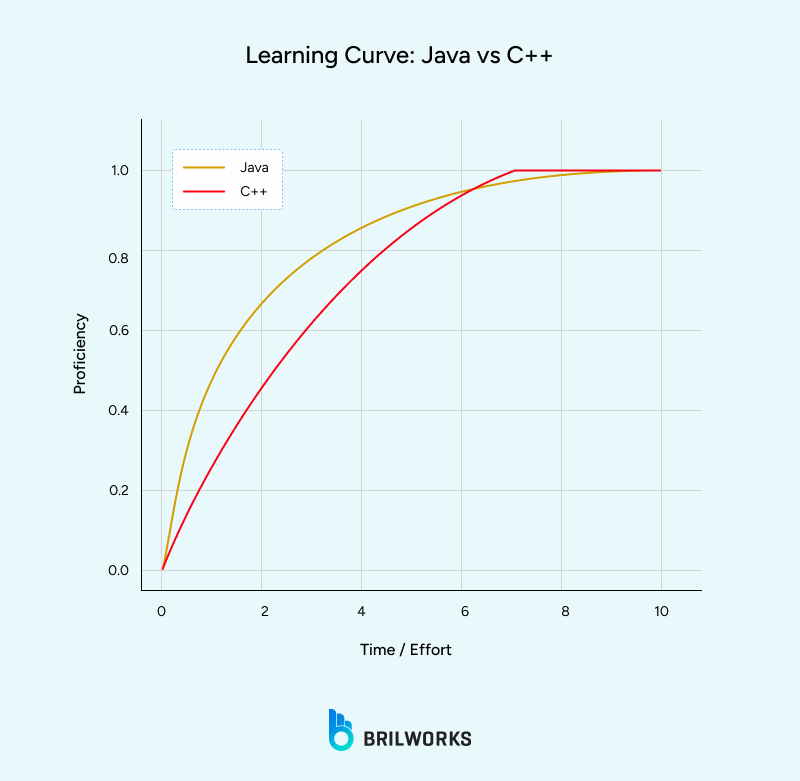
If you are a new beginner comparing Java programming vs C++, then language complexity might be your first research topic. While Java borrows much of its syntax from C++, it deliberately avoids many of the language features that make C++ notoriously difficult to parse, learn, and maintain.
C++ supports a rich and powerful syntax that includes features like value semantics, function overloading, templates, and direct memory manipulation. This flexibility gives developers control, but at the cost of increased language complexity.
Parsing C++ code, even for compilers, can be tricky. The language doesn't follow a strictly context-free grammar, which leads to ambiguity. This ambiguity may complicate compiler design, but it also makes C++ a bit tougher to read and reason about for developers.
Additionally, C++ allows variables, constants, and functions to exist at the namespace level, outside any class or struct. It supports value semantics by default, meaning objects are copied unless explicitly passed by reference.
Pros:
Offers fine-grained control over how code is written and executed
Supports multiple programming paradigms
Ideal for systems programming and performance-critical applications
Cons:
Steep learning curve
Complex syntax with many exceptions and special cases
Easier to introduce subtle bugs due to language flexibility
Java leans more towards simplicity and readability. In contrast to C++, Java omits low-level features like pointers and manual memory management. It also avoids complex constructs such as multiple inheritance, and it enforces a more consistent syntax across the language.
For example, memory allocation is always done with the new keyword, and garbage collection handles deallocation. Java also includes a standardized API library and strong compile-time type checking, which helps catch errors early and makes code easier to maintain.
Pros:
Cleaner, more readable syntax
Easier to learn for beginners
Built-in safeguards reduce the chance of programming errors
Cons:
Less flexible than C++ in low-level programming
Abstraction can hide performance bottlenecks
Let's answer the question now. Java, as you saw, is more approachable, especially if you are a beginner. Its streamlined syntax, managed memory model, and strong typing system contribute to faster development cycles. Furthermore, there are Java frameworks as well if you find something difficult to learn or make.
C++ demands a deeper understanding of language internals and system-level concepts. It is more suitable for high-performance or embedded applications.
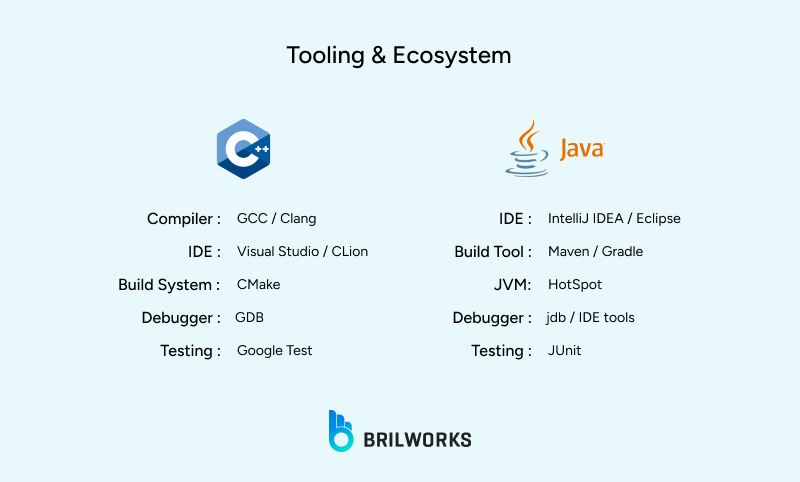
The tooling and ecosystem surrounding a programming language often determine how productive and scalable development can be. In the case of Java vs C++, both languages have mature ecosystems.
Java comes with one of the reliable ecosystems in modern software development. From the moment you install Java Development Kit (JDK), you get access to a complete set of development tools, including a compiler, the Java Virtual Machine (JVM), and the Java Runtime Environment (JRE). There are a lot of core components like these that make up Java.
Moreover, there are popular Java IDEs like IntelliJ IDEA, Eclipse, and NetBeans. These IDEs are beneficial, so businesses should be considerate when choosing one. They offer deep integration, intelligent code assistance, refactoring tools, debugging features, and seamless project management, which makes them worthwhile. Also, there are build tools like Maven and Gradle. Furthermore, Java itself adapts to new language features and version changes over time.
In addition to tooling, Java's vast ecosystem spans across enterprise libraries, open-source frameworks (like Spring and Hibernate), monitoring tools, test automation suites (JUnit, TestNG), and robust documentation. This well-integrated tooling makes Java ideal for long-term, large-scale software projects.
Stable and consistent tooling across platforms
Excellent IDE support with real-time error detection and code insights
Mature libraries and frameworks for everything from web development to microservices
Strong testing and debugging infrastructure
Massive community and documentation resources
C++ also has a mature ecosystem, but it's more fragmented compared to Java. Since C++ is compiled directly to machine code without a virtual runtime like the JVM, the development experience depends heavily on the compiler and platform in use. Popular compilers included GCC, Clang, and Microsoft Visual C++, each with its own flags, extensions, and quirks.
When it comes to IDEs, Visual Studio, CLion, and Eclipse CDT offer support for C++ development. However, setting up a cross-platform C++ project can require more manual configuration compared to Java. Dependency management is also more cumbersome; tools like CMake, Conan, or vcpkg help, but there's no universally adopted standard.
Despite these challenges, C++ offers powerful low levels tools for debugging. They are also among the top choices for systems programming or games.
High-performance compilers with platform-specific optimizations
Strong tooling for debugging and performance profiling
Broad set of libraries for system-level programming
Flexible build systems (CMake, Make)
Vibrant but decentralized open-source community
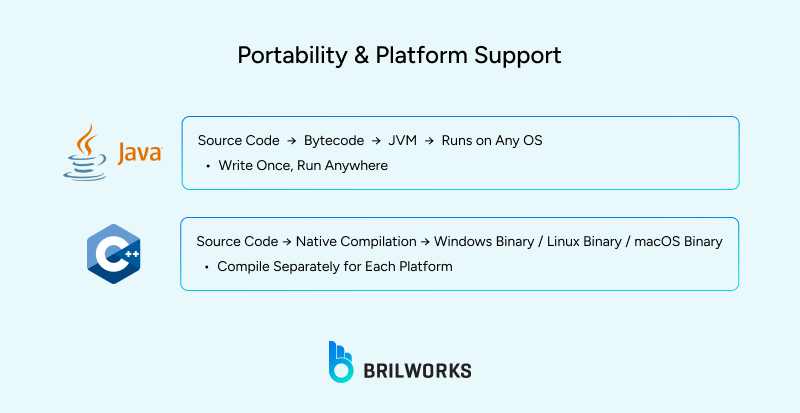
Cross-platform development has been around for quite some time and is still one of the ways that most developers go with. Because why write different codes for each different device? Running your code across different platforms is a major consideration for any programming language. Both languages, Java and C++, take on different approaches. Let's review them.
Java is highly popular for its motto, "Write Once, Run Anywhere." And the technology that enables Java to pull off this move is the JVM. When you compile Java code, it doesn't translate directly into platform specific machine instructions. Instead, it compiles to bytecode, which the JVM interprets at runtime. Since JVMs exist for virtually every major platform, Java programs can run consistently across environments with minimal modification.
This makes Java a preferred choice for deploying apps across diverse environments.
Bytecode runs on any system with a JVM
Consistent behavior across platforms
Ideal for distributed and cross-platform applications
Strong support for containerization (Docker, Kubernetes) and cloud platforms
Cross-platform is popular but it has never defeated native development. Just like native vs cross-platform development, here you can find both of those approaches clashing. C++ code is compiled directly to machine code tailored for the target operating system and hardware architecture. The control feature that makes C++ powerful is what allows your code to run seamlessly on the targeted device or OS. That is why C++ popularity is high among building gaming engines, embedded systems, and real-time processing. However, it also means that portability requires more effort.
Important note, C++ can pull off cross-platform development, but it is not inherently platform-independent. C++ code must be compiled separately for each target operating system, and developers often need to adjust or rewrite parts of the codebase to handle platform-specific differences. While frameworks like Qt or SDL help manage cross-platform compatibility, the process is generally more complex and less convenient than with Java.
Must be compiled separately for each platform
May require platform-specific tweaks or conditionals
Cross-platform support relies heavily on careful configuration
Offers complete control over system resources at the cost of portability
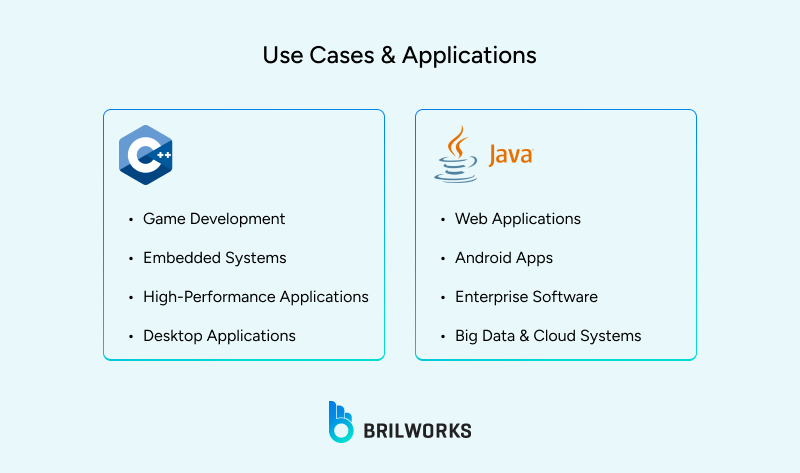
In real-world applications, both Java and C++ are great. It does depend on the skills, so if you are a founder or CTO, then make sure the developers you hire have the right set of skills. If you are outsourcing a development project, then make sure you do it for the right reasons. Because the project you are making can vary a lot.
Java is widely adopted in environments. Thanks to JVM, Java applications can run on any system with minimal configuration, making it a staple in enterprise and cloud ecosystems.
Enterprise Software: Java dominates enterprise backends (banking, insurance, e-commerce) due to its robust frameworks like Jakarta EE and Spring Boot.
Android App Development: Before Kotlin’s rise, Java was the default language for Android, and it still powers a large share of the Android ecosystem.
Web Applications: Java powers many high-traffic web apps and APIs, especially with frameworks like Spring Boot.
Big Data & Cloud: Java integrates well with big data tools like Apache Hadoop and Spark, and cloud platforms like AWS and GCP offer strong Java support.
Cross-platform Applications: Java’s write-once-run-anywhere model is ideal for developing apps that must run across OS environments.
C++ gives developers the ability to fine-tune applications at a deep level, which is essential in domains where performance is important.
Game Development: Game engines like Unreal Engine rely on C++ for real-time graphics and high-performance computations.
Embedded Systems: Devices like routers, IoT gadgets, and hardware controllers use C++ for its small footprint and close-to-hardware control.
High-Performance Applications: C++ is used in software like Adobe Photoshop, video editing tools, and 3D modeling apps that require optimized performance.
Operating Systems & Drivers: Many OS kernels and device drivers are written in C++ or C, where full control over memory and CPU usage is required.
Finance & Trading Platforms: In high-frequency trading systems, where nanoseconds matter, C++ delivers the speed that financial institutions demand.
Here’s a table for quick reference:
|
Criteria |
Java |
C++ |
|
Primary Focus |
Cross-platform development, enterprise-grade apps |
High-performance systems, close-to-hardware control |
|
Typical Industries |
Fintech, e-commerce, telecom, enterprise IT, mobile apps |
Gaming, embedded systems, automotive, finance, operating systems |
|
Popular Use Cases |
Web apps, Android apps, cloud services, big data solutions |
Game engines, system software, real-time processing, trading platforms |
|
Platform Portability |
Excellent (via JVM - write once, run anywhere) |
Limited; platform-specific compilation needed |
|
Memory Management |
Automatic (Garbage Collector) |
Manual (developer-managed) |
|
Learning Curve |
Easier to learn and maintain |
Steeper due to complex syntax and manual memory handling |
|
Performance Sensitivity |
Moderate – good enough for most use cases |
High – optimized for speed and low-level resource control |
|
Mobile Development |
Android (via Android SDK) |
Rare; not typically used for mobile apps |
|
Real-time Systems |
Not ideal due to garbage collection pauses |
Preferred for real-time, latency-critical systems |
Each language was made with the best intent in mind, for easy development, and reliable development. Largely, the choice would be dependent on your project type. Scan through the blog again for reference, or the part where your app specifically focuses on.
At a time like this, consultation is the best step forward. For projects where Java's strengths align best, hire Java developers from a company that specializes in the development domain. it’s important to choose the right developers strategically who understand the ecosystem and can optimize code quality and speed.
The main difference lies in memory management and execution. Java uses automatic garbage collection and runs on the Java Virtual Machine (JVM), making it platform-independent. C++ uses manual memory management and compiles directly to native machine code for performance optimization.
Yes, Java is generally considered easier to learn due to its simpler syntax, automatic memory management, and fewer low-level complexities compared to C++.
C++ typically offers better raw performance since it compiles directly to machine code and allows low-level system access. However, Java's performance is quite competitive, especially with modern Just-In-Time (JIT) compilation and runtime optimizations.
Yes, it’s possible through interoperability tools like Java Native Interface (JNI), which allows Java applications to call C++ libraries. This is often used when high-performance modules are required.
Choose Java for cross-platform applications, enterprise software, Android development, and projects where security, portability, and ease of maintenance are key priorities. C++ is better suited for system-level programming, game engines, and performance-critical applications.
Get In Touch
Contact us for your software development requirements
Get In Touch
Contact us for your software development requirements